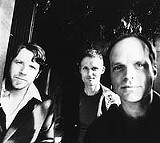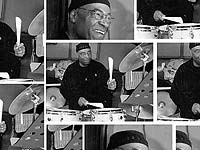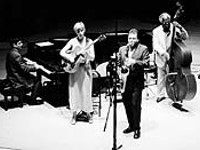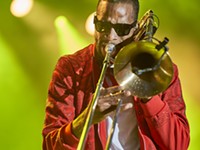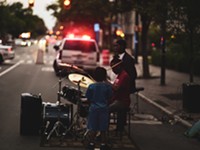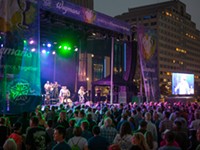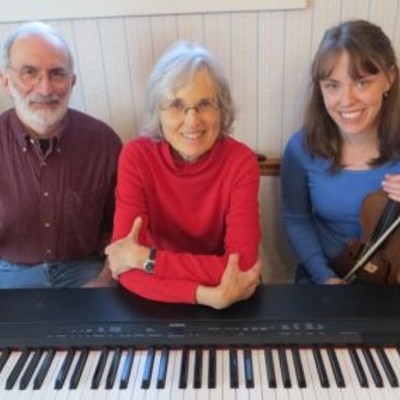[
{
"name": "500x250 Ad",
"insertPoint": "5",
"component": "15667920",
"parentWrapperClass": "",
"requiredCountToDisplay": "1"
}
]
In a music industry that insists on categorization, Medeski Martin & Wood have successfully refused to be pigeonholed. With very little radio airplay, they have built a following across the country and around the world. Perhaps most surprisingly, they have managed to combine borderline avant-garde jazz with catchy grooves, drawing fans from all over the musical spectrum.
Their show should be the hottest ticket of the festival, especially with the addition of DJ Logic.
When we spoke recently by phone with the group's keyboardist, John Medeski, we began by asking him how he arrived at his current musical outlook.
City:When you were a teenage pianist, you were headed in a classical direction. What happened?
Medeski: At the time the idea of going to school for jazz didn't really make a lot of sense to me, so I thought I'd go and major in classical music. But I knew before I went [to New England Conservatory of Music in Boston] that that was not what I really wanted to do.
City: What were you listening to that made you gravitate toward jazz?
Medeski: My dad played a little stride piano. I started playing with him before I even started taking lessons. I would take out some books and play some of those old popular show tunes. I only heard the stuff my parents had, a lot of big band stuff and people like Frankie Carle, that side of popular music. Then when I was 11 or 12, somebody played me Oscar Peterson and I was just like, whoa! From then on I started checking out all kinds of stuff. I had a great teacher, Lee Shaw. She had studied with Oscar and she ended up giving me all kinds of records --- Monk, Bud Powell --- she gave me a really good foundation.
City:So you had mixed feelings in school?
Medeski: When I went to the conservatory they said jazz and classical could work together. That became hard. What attracted me to classical music was what Beethoven was doing, what Bach was doing. It wasn't the actual performing of the music, it was what was going on in the music, and I wanted to find my own music.
City: Some classical people seem to have forgotten that Beethoven and Bach were great improvisers.
Medeski: Exactly! I don't know if you've seen the film The Universal Mind of Bill Evans, but he looks at jazz as the spirit of music that is made in the moment for that moment. He said it used to be in classical music until the late-1800s. Every performer would improvise in cadenzas. Then suddenly there became so many styles that there was a way to play Bach, a way to play Baroque, a way to play Romantic music. And then the whole idea of individuality is gone for the sake of preserving a style. Now the same thing is happening to jazz.
City:What do you mean?
Medeski: You're supposed to play certain tunes a certain way. Bebop is a certain thing; hard bop is another kind of thing. All these styles instead of you playing what you feel and hear that's coming out of you.
City:Is that why you've turned away from traditional jazz?
Medeski: Absolutely. It's all about coming to terms with who I am. Because at the same time I was studying classical music I was listening to Stevie Wonder and Ray Charles and Bob Marley. It's really about trying to be honest about who I am and where I'm coming from musically, instead of being a "jazz" piano player. Ultimately, it's about playing and really tuning in to what I feel and not being afraid of any kind of beat or rhythm or melodic idea.
City: And a lot of people want to hear it.
Medeski: A lot of people like improvisation and want that spirit and that cathartic experience you get when musicians are improvising and the audience is right there checking it out and something is really happening and it's really fresh.
City:What's amazing is that you had your vision and you found an audience and a record company to sign you.
Medeski: I feel like we're really lucky. We're also lucky that we found each other as a trio willing to put the time in. And the timing of when we came around; a lot of our teachers and mentors had a hard time. A lot of the guys who played with Miles had to go to Europe to make a living. What we realized is there are young people in this country who have disparate musical tastes and they're looking for a feeling from music. America --- really the whole idea of freedom and democracy --- jazz is the language of freedom, personal expression, in a certain way.
City: How did you get started?
Medeski: We kind of knew that there would be an audience for this stuff even if it was very small. You've just got to find it. The way to find it is to go and play and attract people. The way to do that is to drop your ego and do it for no money. A lot of people spend their lives studying jazz and classical music and they really develop a high level of artistic expression and then they want to be compensated for it.
City: Did you play for free?
Medeski: Yeah! When we first went out we were sleeping on people's floors. We'd just go and see if we could find somebody to put us up for the night. The way we look at it is, anybody who starts a business has to take a loan. If you're a dentist you've got to buy your equipment and go into debt. We looked at it as an investment. We're going to go out there and play and if we attract 50 or 60 people at the Knitting Factory, we can attract 50 or 60 people in every college town in the country. We'd go out and lose money. At one point, around 1993, we couldn't afford to keep our apartments. We were living in our camper. At the time we had the intensity and the energy to do that.
City: You've been together a long time. Is it still fresh every show?
Medeski: It's felt really fresh again in the past couple of years. There was a moment when the whole jam band scene --- the little circuit out there that we sort of found and started playing --- suddenly there's all these bands out there doing it. Kind of jangley guitar players and mono-dimensional rhythmic music and all this noodling stuff; it kind of became frightening to us. Like, what are we doing? How did we get associated with this? It was kind of a hard time. But then we all started doing other stuff outside the band, which helps feed what we do.
City:What kinds of other projects have you worked on?
Medeski: I did a soundtrack for an audio book of a Kerouac screenplay. I played on the Blind Boys of Alabama's Christmas record. I've been working with Susanna Baca, a Peruvian singer... All kinds of stuff.
City: I've been reading about instant CDs of performances. Are you doing that?
Medeski: We're going to do it. It's not quite instant; you'll get it two weeks later. You have to find different ways of making a living in this modern world, because record companies are suffering, as they deserve to be.
City:Why do you say that?
Medeski: Because they've created this mess that they're in now by downsizing any artistic music. Classical and jazz departments have been downsized for the sake of money-making. The decisions are being made by accountants and lawyers as far as who stays and who goes. That's one of the beauties of Blue Note. They're great.
City:I read Clear Channel was doing the instant CDs. You're not working with them, are you? They're ruining radio.
Medeski: They're ruining music. I think the instant CD thing is good if bands do it themselves. At the end of the day the audience will buy things that are very much endorsed by the band if they love the band, because they want to support the people making the music. But the record companies have created a thing where the profit margin is so sick --- everybody knows it --- that they'd rather just download it. A CD costs a couple of bucks and they're charging $20 in a store. You couldn't make records at home so the quality the record company provided was higher than one could create at home. Now they can't give us anything you can't do at home.
City: When you're in a concert playing and improvising and it's really going well, what's in your head?
Medeski: Very little. If you're surfing, as soon as you start really noticing what you're doing, you fall over. The whole thing is to keep tuned in. Mainly it's the music that's going through your head. Then you start feeling like we need to go here, so I'll give Chris [Wood] a cue for a different chord change. Really being in it is the key.
City: Is the audience a part of that?
Medeski: I think so. You feel it. They are when they're ready for it. Unfortunately, because of this whole jam band thing, there tends to be this sort of meathead, frat mentality. These guys just want to hear some heavy grooving, rocking thing all the time.
City: You've attracted some Deadheads, haven't you?
Medeski: Actually, Deadheads are pretty good because they're open. It's more like the guys who want to hear the same stupid riff for three hours. We like to break it up. Sometimes I think some of these kids haven't learned about foreplay yet. You've got to build up to it. That's what makes it feel so intense, the development period and then bam! it hits you. I keep wanting to stop some time and ask these guys, 'Is your girlfriend here?' And then ask her, 'Does he know about foreplay or does he just want to get in there and get it over with?'
City: How does the DJ fit in.?
Medeski: To me, it's just another great instrument. Herbie Hancock had it when he did "Rockit" a long time ago. Now, there are a lot of DJs who are very creative and can improvise and the scope of what they do is so immense that it's always a great addition. Because DJs perform solo and create beats and forms and structure, when a good DJ plays with us their sense of composition is a lot of times better than a lot of instrumentalists because they have that experience of creating a whole. A lot of people just want to come in and play their stuff all over you. A lot of DJs are very good at fitting in to what's going on and finding the right part. That should be the ultimate goal of any musicians playing together: to do what's needed for the music not just to get your rocks off and do your thing.
City:You've been able to bring elements of the avant-garde to a larger public.
Medeski: That's what we love. When I was a kid, Cecil Taylor was one of the first jazz pianists I really related to. I love all kinds of music, contemporary classical... So many concepts have been opened: What is melody? What is harmony? It's suddenly been blown wide open. And we use it all. To me it feels natural.
City: When you think about it, Hendrix and The Doors got pretty far out there.
Medeski: Yeah, it feels as normal to me as playing a triad. When you feel it, you do it. When we go there we know that we're probably stretching the audience a little, but what are you going to do?
City: What do you see in the future?
Medeski: I think some great music's going to happen in the next 10 years. A lot of stuff has been blown open and a lot of young kids are going to be coming up and it's going to be like the 1960s. Also, the world is so screwed right now. America's not so comfortable and fat and I think we'll get to hear it in the music. It's always been there, it's been happening in HipHop.
Medeski Martin & Wood play with DJ Logic on Friday, June 14, at the High Falls Festival Site. Doors open at 5 p.m.
In This Guide...
Latest in Rochester International Jazz Festival
More by Ron Netsky
-
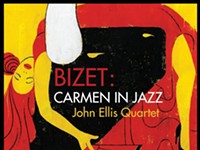
Album Review | 'Bizet: Carmen in Jazz'
Mar 26, 2024 -
'To Swing Is the Thing" by Mike Melito
Aug 10, 2023 - More »
